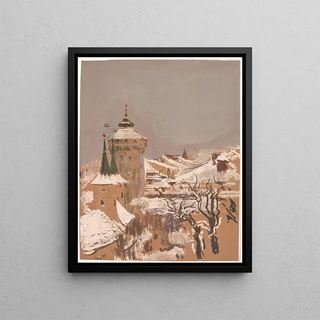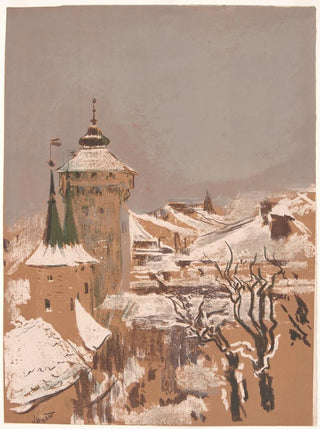Art print | The Florian Gate in Kraków from the windows of the Academy of Fine Arts - Leon Wyczółkowski


View from behind

Frame (optional)
Art print La Porte Florian in Kraków from the windows of the Academy of Fine Arts - Leon Wyczółkowski – Captivating introduction
In the Polish art scene, the work of Leon Wyczółkowski stands out for its ability to capture the very essence of urban life at the end of the 19th century. Art print La Porte Florian in Kraków from the windows of the Academy of Fine Arts is a striking depiction of the city, where each brushstroke evokes a vibrant and dynamic atmosphere. This painting, both rooted in tradition and open to the modern world, invites us to explore Kraków through the eyes of an artist deeply attached to his culture. Gazing at this piece, the viewer is transported to a suspended moment, where time seems to stand still and the beauty of everyday life takes on its full significance.
Style and uniqueness of the work
Wyczółkowski's work is characterized by technical mastery that combines impressionism and realism. Light plays a crucial role in this composition, creating delicate shadows that highlight the architectural details of La Porte Florian. The colors, both vivid and nuanced, testify to a meticulous observation of the surrounding world. The artist manages to render the atmosphere of Kraków with such precision that one can almost hear the murmur of passersby and the rustling of leaves. The chosen perspective, from the windows of the Academy of Fine Arts, offers a unique, almost intimate view, engaging the viewer to immerse themselves in this urban scene. By capturing this fleeting moment, Wyczółkowski reminds us that every street corner holds a story, an emotion, a life.
The artist and his influence
Leon Wyczółkowski, born in 1852, is often regarded as one of the pioneers of Polish impressionism. His training at the Academy of Fine Arts in Kraków, followed by his travels to Paris, profoundly influenced his style. He skillfully integrated modern techniques while remaining faithful to his Polish roots. Wyczółkowski does not merely reproduce reality; he transcends it, infusing his works with a visual poetry that re

Matte finish

View from behind

Frame (optional)
Art print La Porte Florian in Kraków from the windows of the Academy of Fine Arts - Leon Wyczółkowski – Captivating introduction
In the Polish art scene, the work of Leon Wyczółkowski stands out for its ability to capture the very essence of urban life at the end of the 19th century. Art print La Porte Florian in Kraków from the windows of the Academy of Fine Arts is a striking depiction of the city, where each brushstroke evokes a vibrant and dynamic atmosphere. This painting, both rooted in tradition and open to the modern world, invites us to explore Kraków through the eyes of an artist deeply attached to his culture. Gazing at this piece, the viewer is transported to a suspended moment, where time seems to stand still and the beauty of everyday life takes on its full significance.
Style and uniqueness of the work
Wyczółkowski's work is characterized by technical mastery that combines impressionism and realism. Light plays a crucial role in this composition, creating delicate shadows that highlight the architectural details of La Porte Florian. The colors, both vivid and nuanced, testify to a meticulous observation of the surrounding world. The artist manages to render the atmosphere of Kraków with such precision that one can almost hear the murmur of passersby and the rustling of leaves. The chosen perspective, from the windows of the Academy of Fine Arts, offers a unique, almost intimate view, engaging the viewer to immerse themselves in this urban scene. By capturing this fleeting moment, Wyczółkowski reminds us that every street corner holds a story, an emotion, a life.
The artist and his influence
Leon Wyczółkowski, born in 1852, is often regarded as one of the pioneers of Polish impressionism. His training at the Academy of Fine Arts in Kraków, followed by his travels to Paris, profoundly influenced his style. He skillfully integrated modern techniques while remaining faithful to his Polish roots. Wyczółkowski does not merely reproduce reality; he transcends it, infusing his works with a visual poetry that re






